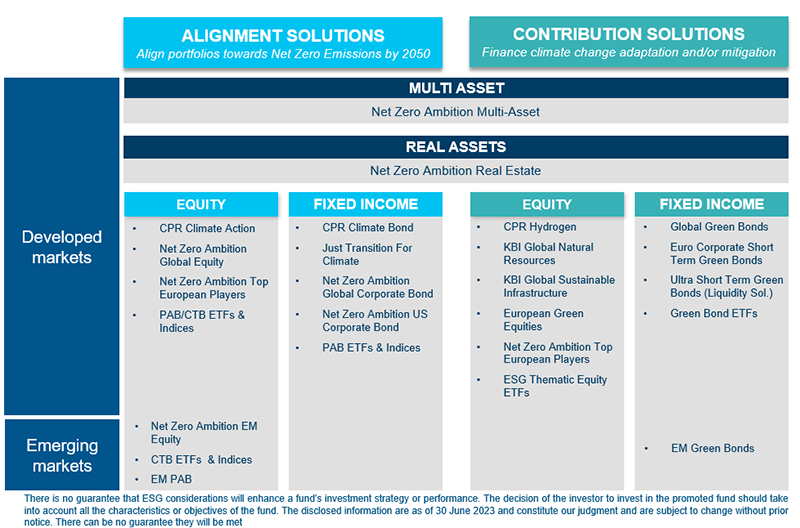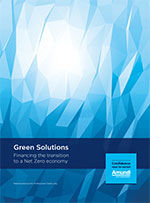Race to Net Zero

As an actor of transition, Amundi is committed to supporting the goal of net zero emissions by 2050.
Climate Change is arguably the greatest challenge of our times
There is an urgent need to accelerate the transition of our economy towards a low carbon model in order to collectively reach the global objective of net zero emissions by 2050 or sooner.
As a pioneer in responsible investment, Amundi has a role to play in supporting investors wishing to participate in this transition.
As part of its efforts to address this challenge, in July 2021, Amundi joined the Net Zero Asset Managers initiative. This initiative gathers asset managers that are committed to working in partnership with asset owners on de-carbonization by:
- Transforming their product range and engaging with clients to progressively allocate assets to investment solutions aligned with the net zero objective,
- Implementing an engagement strategy, including a set of interim targets for 2030, in line with the objective of net zero emissions.
What does Net Zero mean?
Net Zero refers to a global state where the amount of greenhouse gas emissions produced and the amount removed are equal. It is an equivalent of “carbon neutrality”.
Reaching Net Zero relies on two pillars:
- Reducing carbon emissions to their minimum, by favouring energy efficiency, low carbon solutions and energy sobriety.
- Developing carbon sinks with the objective of removing further carbon from the atmosphere. These can be natural (forests, soil, oceans) or technological, also known as carbon capture and storage (CSS) solutions.
Read more
Why do we need to reach the Net Zero global objective?
In 2015, under the Paris agreement, commitments were made to drastically reduce greenhouse gas emissions, bringing them “close to zero” by 2050. This agreement allowed public and private players to increase their climate engagement.
There is a global consensus that reaching the Net Zero objective by 2050 should avoid the worst consequences of climate change.
Read more
What role can investors play?
Why Net Zero for investors?
Global warming and the Net zero transition have far-reaching implications for investors notably as they will need:
- To consider how the transition will impact economic and financial variables considered in strategic asset allocation
- To reassess their traditional asset allocation approaches to appreciate the fundamental shifts in the world’s economy caused by climate change and its impact on returns expected across asset classes.
- To face trade-offs when they will introduce climate considerations into their portfolios (notably between the levels of portfolio diversification and of incorporation of climate targets)
How to implement Net Zero targets?
For climate targets to be realized, asset allocation decisions can be implemented through different ways which are non-mutually exclusive:
- Using a passive climate-aligned benchmark, such as a Paris-Aligned Benchmarks (PAB)
- Investing in Net Zero active cross-asset solutions, which aim to reduce the carbon footprint of portfolios
- Or using an active cross-asset climate strategy which incorporates specific targets for green investments.
How can Amundi support clients on their Net Zero journey?
At Amundi, we are committed to providing a broad range of investment solutions that support our clients in their Net Zero journey.
Our Green solutions

Just Transition for Climate
Among these solutions, Amundi has built a Just Transition for climate strategy to address social impacts resulting from the transition to low carbon economies.
Discover our green solutions brochure

Amundi is strongly engaged on environmental finance.
Want to know more?
Visit the Amundi Institute to discover our must read articles, videos and podcasts dedicated to Net Zero.
In the same section

Responsible investment offering
A wide range of responsible solutions from open-ended funds to tailor-made Responsible Investment.

Social Initiatives
Social impact innovative solutions reaching financial performance objectives.

Responsible Investing: our commitment
Acting as a responsible financial institution is a core commitment of Amundi’s development strategy.
_____________________
1. Source: Amundi, data at 31/12/2023
This information is exclusively intended for “Professional” investors within the meaning of the MiFID Directive 2004/39/EC of 21 April 2004, and articles 314-4 and following of the General Regulations of the AMF. It is not intended for the general public or for non-professional individual investors within the meaning of all local regulations, or for “US Persons”, as defined in the Securities and Exchange Commission’s “Regulation S” under the 1933 U.S. Securities Act.
This non-contractual information does not under any circumstances constitute an offer to buy, a solicitation to sell, or advice to invest in financial instruments of Amundi or one of its affiliates (“Amundi”).
Investing involves risks. The performance of the strategies is not guaranteed. In addition, past performance is not in any way a guarantee or a reliable indicator of current or future performance. Investors may lose all or part of the capital originally invested.
Potential investors are encouraged to consult a professional adviser in order to determine whether such an investment is suitable for their profile and must not base their investment decisions solely on the information contained in this document.
There is no guarantee that ESG considerations will enhance a fund’s investment strategy or performance.
Amundi assumes no liability, either direct or indirect, resulting from the use of any of the information contained in this document, and shall not under any circumstances be held liable for any decisions taken on the basis of this information. This information may not be copied, reproduced, modified, translated or distributed, without the prior written approval of Amundi, for any third person or entity in any country or jurisdiction which would subject Amundi or any of its products to any registration requirements within these jurisdictions or where this might be considered unlawful.
This information is provided to you based on sources that Amundi considers to be reliable, and it may be modified without prior warning.

















